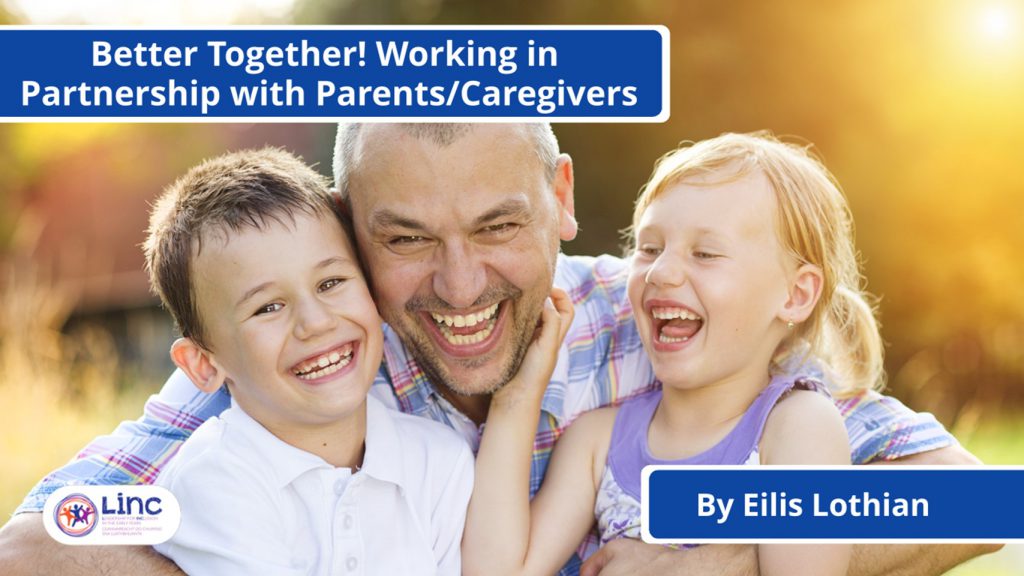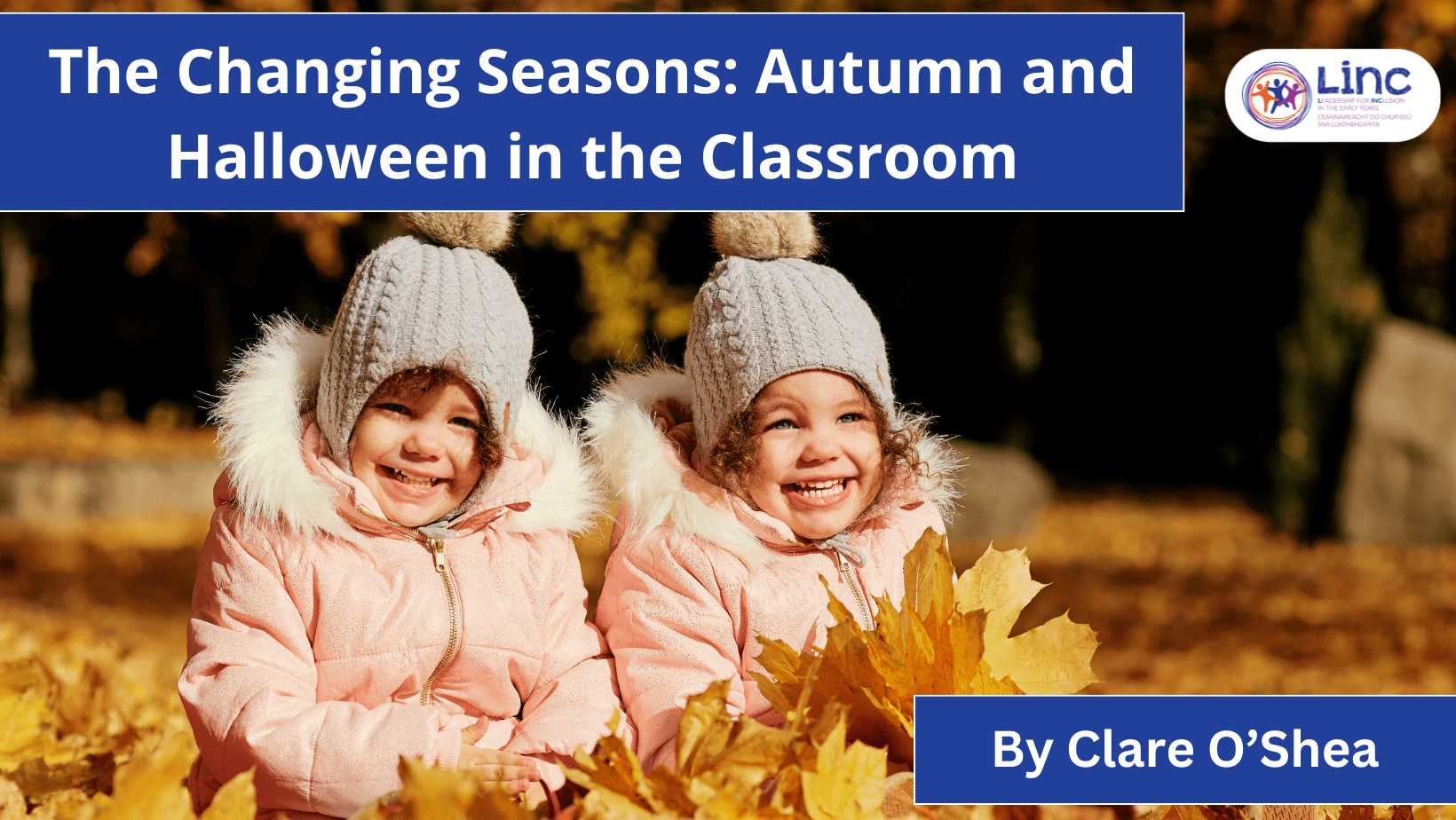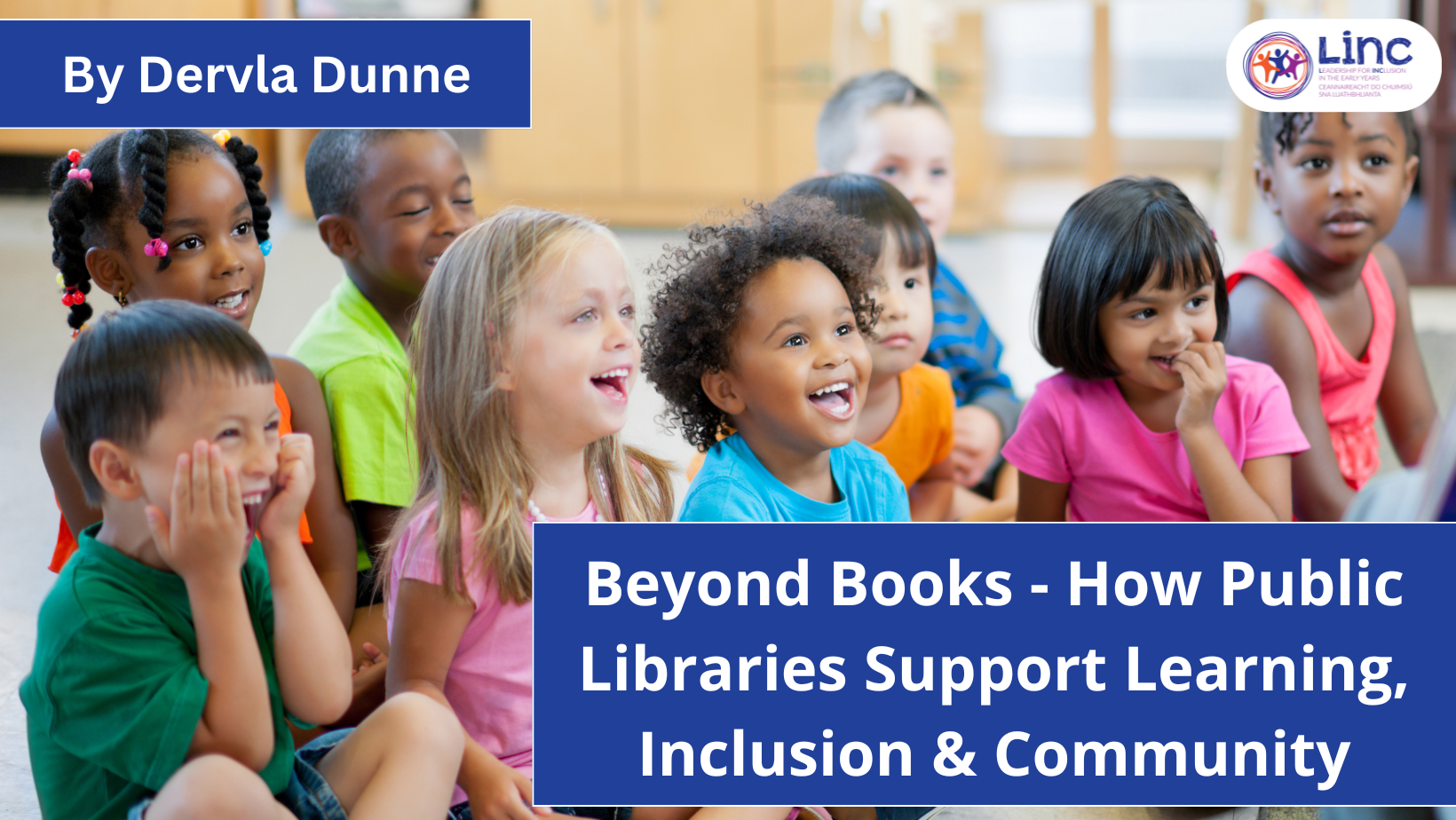Better Together! Working in Partnerships with Parents/Caregivers
In this edition of the LINC Blog, Better Start Early Years Specialist Eilis Lothian discusses the importance of a partnership approach between Parent/Carers, the Early Years Setting and the AIM Early Years Specialist, and how a partnership approach supports children’s Sense of Self. Eilis provides some tips and ideas for working in partnership with parents/carers, including how we can support children’s transition from the home environment to the setting.

“…in [their] early years children learn through loving, trusting and respectful relationships…” [1]
According to Síolta, the National Quality Framework for Early Childhood Education an effective partnership between Early Learning and Care (ELC) Settings and parents/caregivers is a fundamental component of quality provision in ELC [2].
The idea of partnership within the context of ELC can be understood as a process during which parents/caregivers and the Early Years Educator (EYE) work together for the child, with a responsibility for each person involved to recognise and value what the other does. These caring and mutually respectful relationships play a key part in building a child’s sense of self [3].
Working in partnership with the parents/caregivers of children in my care is central to my pedagogical practice and ethos, something I strive to maintain as an Early Years Specialist (EYS) with the Access and Inclusion Model (AIM). AIM is a child-centred model of 7 Levels of progressive support, ranging from Universal to Targeted and is based on the strengths, interests and needs of the child and their ELC Setting [4].
From my perspective as an EYS, the relationship with the parents/caregivers of a child is formed right from the start of the child’s AIM journey. Parental/caregiver input is a central part of making an AIM application. The ELC Setting works together with the child’s parents/caregivers to decide which supports are most meaningful in nurturing the child’s early growth and development [5]. In the course of my work I actively collaborate with parents/caregivers via telephone and during face-to-face meetings. The ELC Setting also nurtures the formation of this relationship by supporting information-sharing with and between the parent/caregiver and the EYS.
Tips/Ideas – Working in Partnership with Parents/Caregivers
- Upon Enrolment
- After a child has been enrolled, the Setting Manager and EYE Team should plan a meeting with the child’s parents/caregivers before their start date, to share important information to support the child as they make the transition from home to the ELC Setting
- Invite parents/caregivers to take an active role in supporting their child to transition. In my role as an EYS I suggest to EYE Teams Section 3 – Transition into Pre-school (Signposts for Reflection) from ‘My Inclusion Plan’ document (available here: https://aim.gov.ie/app/uploads/2021/08/Access-and-Inclusion-Plan-My-Inclusion-Plan.pdf)
- This can be used as a stand-alone document, acting as a useful planning tool which can be completed together by the Setting Manager, EYE Team and the child’s parents/caregivers. This Transition into Pre-school Plan can provide a meaningful foundation for educational advice and mentoring at AIM Level 4, by providing relevant and useful information about how the child’s transition journey has been planned and implemented
- In my previous role as an EYE, I found that information about whether the child has a special comfort object such as a Blankie were important pieces of information. It helped in creating that instant bond and especially helped when they were feeling sad or upset
- Additionally, information such as a child’s interests were helpful to support my curriculum planning. Using the child’s interests to underpin activities and curriculum themes can really help children to feel comfortable and welcome in their environment.
- Self-Reflection is Key
- Taking some time to reflect can be valuable in understanding how your ELC Setting currently undertakes its partnership approach
- The Aistear-Síolta Practice Guide contains a practice Self-Evaluation Tool (Building Partnerships with Parents – Birth – 6 Years), available here: https://www.aistearsiolta.ie/en/building-partnerships-with-parents/self-evaluation-tools-/self-evaluation-tool-building-partnerships-with-parents.pdf
- This self-evaluation tool contains a range of different elements, supporting the EYE Team to consider how information is shared with parents/caregivers and how learning and development can be facilitated at home
- The tool contains a planning section after each element, which can be used as a space in which strengths, challenges and plans can be recorded.
- Extend the Invitation
- Consider how parents/caregivers can be active participants in their child’s day in ELC, for example,
- Breakfast Club – invite parents/caregivers to have breakfast with their child/children in the ELC Setting
- Use parents/caregivers’ skills – is a parent a particularly skilled baker? Is another very arty or musical? Invite them in to show the children how to bake for example. Younger children and babies may really enjoy musical mornings!
- Teddy Bears’ Picnic – like Breakfast Club above, hold a Teddy Bears’ Picnic event where parents/caregivers can have lunch with their child/children.
References
[1] National Council for Curriculum and Assessment (NCCA) (2009) Aistear: The Early Childhood Curriculum Framework, (p. 6), Dublin: National Council for Curriculum and Assessment.
[2] Centre for Early Childhood Development and Education (CECDE) (2006) Síolta Research Digest Standard 3: Parents and Families, [online]. Available at: https://siolta.ie/media/pdfs/Research%20Digest%20-%20Parents%20and%20Family.pdf [Accessed 16th June 2022].
[3] National Council for Curriculum and Assessment (NCCA) (2009) Aistear: The Early Childhood Curriculum Framework: Guidelines for Good Practice, Dublin: National Council for Curriculum and Assessment.
[4] Government of Ireland (GoI) (2021) The Access and Inclusion Model, available: https://aim.gov.ie/ [accessed 17/06/2022].
[5] Department of Children and Youth Affairs (DCYA) (2016) Diversity, Equality and Inclusion Charter and Guidelines for Early Childhood Care and Education, available: https://assets.gov.ie/38186/c9e90d89d94b41d3bf00201c98b2ef6a.pdf [accessed 17/06/2022].

Eilis Lothian
Eilis completed a Level 8 Degree in Early Childhood Care and Education in the Institute of Technology Sligo and a Level 9 MA in Child, Family and Community Studies in Dublin Institute of Technology. Eilis has worked previously as a Manager and Early Years Educator in a Pre-school and After-school Setting, caring for children from 2 years and 8 months up to 12 years of age. Eilis is currently working with Better Start National Early Years Quality Development as an Early Years Specialist on the AIM programme. Supporting and modelling an inclusive ECCE environment is a core part of her work ethic.
You may also like:

The Changing Seasons: Autumn and Halloween in the Classroom
The Changing Seasons: Autumn and Halloween in the Classroom In this edition of the LINC Blog, “The Changing Seasons: Autumn and Halloween in the Classroom,” LINC tutor Clare O’Shea shares activity ideas, reflections on Aistear’s themes, and practical tips for making...

Beyond Books – How Public Libraries Support Learning, Inclusion and Community
Beyond Books - How Public Libraries Support Learning, Inclusion & Community In this edition of the LINC Blog, “Beyond Books – How Public Libraries Support Learning, Inclusion & Community”, Dervla Dunne, A/Librarian at Wexford Town Library, takes us on a tour of...

The LINC Programme and MIC Support Shine’s 2025 Green Ribbon Campaign: Step Up to Stamp Out Stigma
The LINC Programme and MIC Support Shine’s 2025 Green Ribbon Campaign: Step Up to Stamp Out StigmaThe Leadership for Inclusion in the Early Years (LINC) Programme and Mary Immaculate College (MIC) are proud to once again support the national Shine Green Ribbon...
